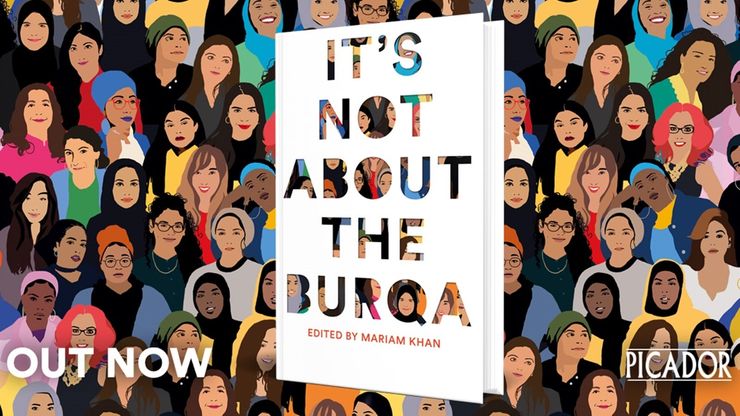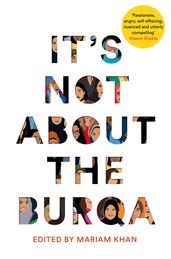What does it mean to be a Muslim woman? Spoiler: it’s not about the Burqa
It's Not About the Burqa gives voice to seventeen Muslim women, who speak openly about sex, faith, mental health, love and the reality of all that it means to be a Muslim woman in the West today. Here, Mariam Khan tells us what she's learnt since the book's publication.

When Mariam Khan read that David Cameron, then British Prime Minister, had privately suggested that the ‘traditional submissiveness of Muslim women’ was a leading factor in leaving young men vulnerable to radicalisation she was ‘pretty pissed off’. She remembers: ‘That really just stayed in my mind, and I really wanted to say no, hang on, that’s not who I know or what I know of Muslim women, and I wanted us to have a say.’ It’s Not About the Burqa was borne out of that anger, a collection of essays that gives voice to an often unheard section of the Muslim community.
Mariam felt that too often, only one narrative of Muslim women was portrayed within the national news headlines, and what’s more, this narrative and the conversation surrounding it are not only being lead by those who are white and male, but they exclude Muslim women themselves entirely.
Where is the space for Muslim women to comment? To share their own thoughts, truths, opinions and realities? Feeling as though the voices of Muslim women were being pushed increasingly into the very fringes of the conversations of which they were the subject, Mariam set into action, and It’s Not About the Burqa began to take shape. Here, Mariam tells us what she’s learnt in the last year.
‘For the longest time, I wanted everyone else to realise the diversity of what it meant to be a Muslim woman. That’s why this book exists but along the way, I cemented this belief for myself too. I really embraced how different we all are.
We are all Muslim women – but that doesn’t mean we have the same opinions or personalities and through editing and events and the friendship we’ve built amongst the INATB sisterhood I’m grateful that we are all Muslim women but each individual with different opinions and views and we aren’t afraid to respectfully explore each other’s views. As much as this book is a dialogue with the reader, we, the contributors were speaking to each other too.
I’ve learnt that I’m not frustrated by people telling me they liked some essays and not others – that is the point of an anthology really. But what does frustrate me is when people point out x, y or z hasn’t been addressed in the book. I share their frustration but could only publish one book. That book already contains seventeen different voices. What this frustration is an amalgamation of is the lack of representation in publishing which then turns into this desperate need to want everything represented in a single book. We need more books by Muslim women. More non-fiction books, more fiction books, more romance books – just more books by Muslim women.
I didn’t write or curate INATB to be liked. I wrote it because I wanted to have so many conversations with many different people and there was never a foundation to start from. This book is the book I wish my younger self had.
My biggest learning is that a year on I, and many of the women in the book, would probably write our essays differently because identity is an evolving thing and we all changed in the process of this book being edited and published. This book was never about being perfect, it was about being honest and creating a dialogue. Our lives aren’t stagnant and I’ve grown, I’ve learned, I’ve asked more questions and had more experiences since publication so it’s inevitable that my essay would be different now from what it was when I wrote it originally. This is not a regret, just an honest acknowledgement of the medium of print publishing.
A lot of people want to listen and a lot of people don’t want to listen. It’s by default become my job to point out privilege and challenge how and by who by Muslim women are represented in society. I’m here to challenge people – if you feel challenged by the book and by me then good because I’ve been uncomfortable with Islamophobia and racism and sexism for a long time. We can’t make those with power share their power but it’s about time those with privilege were challenged and made uncomfortable too.’
We asked a handful of the inspirational writers who contributed to It’s Not About the Burqa, which three words or phrases come to mind when they are asked to describe a Muslim woman. Their answers? Opinionated. Outspoken. Empowered. Curious for knowledge. Kind. Having faith. Fierce. Fearless. Revolutionary.
Moving, witty, enlightening and empowering - this is an anthology that, regardless of what walk of life you come from, should be considered compulsory reading.
What does it mean, exactly, to be a Muslim woman in the West today? According to the media, it’s all about the burqa.
Here’s what it’s really about.
It's Not About the Burqa
by Mariam Khan
It's Not About The Burqa offers a voice to the women that you don't see represented in the national media, women speaking frankly about the hijab and their faith, love and sex, feminism, queer identity, and racism.



